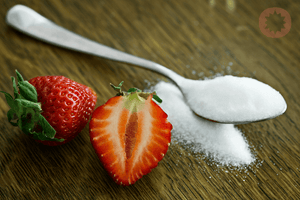
Perusing the internet, you will find loads of information on the dangers of eating too much sugar. Pages and pages on the harmful effects of sugar on the body, and how excessive consumption of sugar leads to addiction, brain problems, diabetes, liver inflammation, cardiovascular disease, tooth decay, and so many other issues. There is no doubt that an inflamed diet consisting of mostly sugary donuts, sugary beverages, desserts, candy with artificial sugars and ingredients lead to those problems. Excess consumption of refined sugar and processed foods that are loaded with refined sugars also can lead to addictive sugar cravings, overweight issues, and a weaker immune system and overall health.
However, after reading the available information about sugar on the web, do you walk away asking yourself...
We would argue that when an ingredient gets a bad reputation, as sugar has in recent years, people overreact by treating the ingredient like the plague. However, stepping back, this may be an emotional overreaction rather than a balanced perspective on one of the most basic carbohydrates your body needs for energy to stay alive. Without carbohydrates from food, we would be malnourished, and eventually our bodies would not function.
Sugar, the term, is misused many times and can be quite confusing. Some people refer to sugar as the refined granulated sugars used in desserts, but really fruit has sugar, meat has sugar, vegetables have traces of sugar. Sugar is measured in grams and most, if not all, natural foods that grow in the ground, are gathered, or are raised, contain some level of sugar because it is the energy that fuels our bodies. The better question to ask is how much sugar is in something (grams), and what kind of sugar is making up those sugar grams.
According to The Great Hedge of India and other sources, sugar has been produced in the Indian subcontinent since ancient times. Sugar long ago was not plentiful or cheap so honey was used more often for sweetening in most parts of the world. Originally, people chewed raw sugarcane to extract its sweetness. So, sugar is an ancient food, and consumed during times when people were not having issues with diabetes or getting overweight. The question is why now in modern times? From what we know today, the complete answer is not known yet, but one observation is that our ancient forefathers did not consume a lot of sugar since it was expensive. Also, ancient times did not use synthetic manufacturing processes for the little sugar they consumed. These two observations can serve as a common sense approach to one's view on sugar for a more balanced and healthy life.
Count your sugar grams: limit foods that contain many grams of sugar such as desserts, prepared bottled sauces, breakfast cereals, etc. Read the label for sugar grams, and occasional consumption can be viewed as a splurge rather than an everyday meal. Consuming 20 grams of sugar without knowing can be problematic, especially if you add a beverage and are not aware of the sugar grams. Keep in mind even dairy has sugar, such as an Icelandic yogurt cup (150 grams) can contain 9 grams of sugar, and some of the flavored yogurts can have 17 grams of sugar for one little cup that is part of breakfast.
The kind of sugar matters: There is sugar in fruit, meat, trace amounts of sugar even in vegetables (especially root vegetables), and these are healthy to consume unless you have a strict reason for watching your sugar levels. Fruit concentrates, fruit juices, fruit purees (especially those in pouches for kids) are still sources of sugar, and usually those sugar grams are quite high especially if the fiber has been stripped and you are left with pure sugar from the fruit. Sugar is sugar, it's still sugar. This is the usual problem with juices, including fresh pressed juices, the sugar content is high from the fruit because all the fiber that you would have been chewing to help you feel full has been taken away, making it easy to consume more sugar.
Natural processed cane sugar, syrup, granulated sugar, raw sugar in limited amounts are no problem for most people, especially when a product or serving is only a few grams. This coincides with ancient consumption levels of sugar.
The DO NOT EAT SUGAR LIST for us is: synthetic sweeteners. High fructose corn syrup, 'fructose' or 'sucrose' on label are synthetic sugar sources, artificial sweeteners like sucralose, artificial sweeteners found in 'diet' products like aspartame, and there are many, many more sugar derivatives that are synthetic.
In summary, all things in moderation leads to a more balanced life and decision making. You must read labels and gain knowledge about what you eat. If you care, your body will care for itself in the long run.
